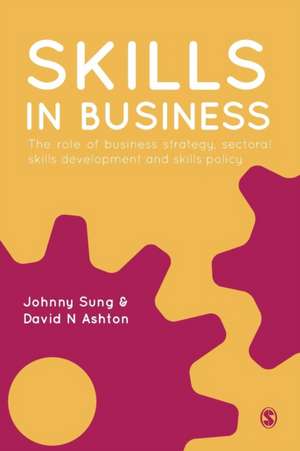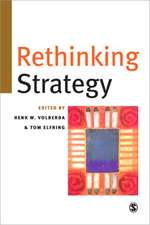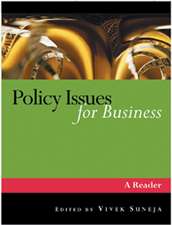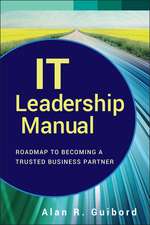Skills in Business: The Role of Business Strategy, Sectoral Skills Development and Skills Policy
Autor Johnny Sung, David N Ashtonen Limba Engleză Paperback – 17 noi 2014
- Irena Grugulis, Leeds University Business School
"A much needed contribution to the complex debate of how skills can best be utilised to enhance company performance, with particular emphasis on an innovative sectoral approach. It is a model of clarity in its presentation of the authors’ conceptual models using a historical narrative as well as comparative case studies in both the UK and Singapore."
- Bert Clough, Leeds University Business School
Public skills policy in most market economies in the last forty years made one repeated error, time and again. We seem to be unable to learn from those mistakes. Consistently, public policies view a wide range of economic and social issues e.g. low productivity, low-skilled jobs, low wage, inequality and in-work poverty as the consequence of skills deficits and a lack of qualifications held by individual workers. Whilst mis-diagnosing the source of the problems and failing to deliver any effective change, public skills policies continue with a policy prescription of ‘more skills’ and ‘more degrees’. If we have not solved the problems with this decade-old approach, why should the same medicine work this time?
This book examines the role of public skills policy from a completely different perspective. It starts by challenging the lack of a systematic analysis of the link between skills utilisation and business strategy, and provides a new model for fresh thinking. The book extends this theoretical analysis to examine the implications for the sectoral approach to skills development as a more effective form of public skills policy.
David N. Ashton is Emeritus Professor at the University of Leicester and Honorary Professor at Cardiff University.
Johnny Sung is at The Institute for Adult Learning, Singapore Workforce Development Agency, Singapore.
Preț: 372.03 lei
Nou
Puncte Express: 558
Preț estimativ în valută:
71.19€ • 74.48$ • 59.14£
71.19€ • 74.48$ • 59.14£
Carte tipărită la comandă
Livrare economică 02-16 aprilie
Preluare comenzi: 021 569.72.76
Specificații
ISBN-13: 9781849201100
ISBN-10: 1849201102
Pagini: 232
Dimensiuni: 156 x 234 x 12 mm
Greutate: 0.35 kg
Ediția:1
Editura: SAGE Publications
Colecția Sage Publications Ltd
Locul publicării:London, United Kingdom
ISBN-10: 1849201102
Pagini: 232
Dimensiuni: 156 x 234 x 12 mm
Greutate: 0.35 kg
Ediția:1
Editura: SAGE Publications
Colecția Sage Publications Ltd
Locul publicării:London, United Kingdom
Recenzii
Makes a much needed contribution to the complex debate of how skills can best be utilised to enhance company performance, with particular emphasis on an innovative sectoral approach. It is a model of clarity in its presentation of the authors’ conceptual models using a historical narrative as well as comparative case studies in both the UK and Singapore.
Johnny Sung and David Ashton are two of the leading scholars in the area of skills. This book combines challenging theories with cutting edge research in a way that should bring skills to life for students. I strongly recommend it for anyone researching or studying in this area.
Johnny Sung and David Ashton are two of the leading scholars in the area of skills. This book combines challenging theories with cutting edge research in a way that should bring skills to life for students. I strongly recommend it for anyone researching or studying in this area.
Cuprins
Introduction
The Challenges Facing Skills Policy in the 21st Century
The Long Wait is Over: Linking Business Strategy to Skills
Technical Relations and Skill Levels
Interpersonal Relations and Skill Utilisation
Skills, Performance and Change
A Sectoral Approach to Skills Development and Public Skills Policy
Conclusion
The Challenges Facing Skills Policy in the 21st Century
The Long Wait is Over: Linking Business Strategy to Skills
Technical Relations and Skill Levels
Interpersonal Relations and Skill Utilisation
Skills, Performance and Change
A Sectoral Approach to Skills Development and Public Skills Policy
Conclusion
Notă biografică
Professor Johnny Sung is a Principal Research Fellow at the Institute for Adult Learning and a visiting professor for the Institute of Education at University College London.
Descriere
This book examines the role of public skills policy from a new perspective. It starts by challenging the lack of a systematic analysis of the link between skills utilisation and business strategy, and provides a new model for fresh thinking. It extends this theoretical analysis to examine the implications for the sectoral approach to skills development as a more effective form of public skills policy.














